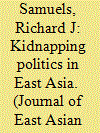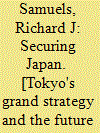|
|
|
Sort Order |
|
|
|
Items / Page
|
|
|
|
|
|
|
| Srl | Item |
| 1 |
ID:
159475


|
|
|
|
|
| Summary/Abstract |
The growth of Chinese military power poses significant challenges to Japan. China's military spending, which was half that of Japan's in 1996, is now three and a half times as large. Japan has taken a range of measures to buttress its military forces and loosen the restrictions on their operations, but much remains to be done. Most important, Tokyo needs to reexamine its strategy to maximize Japan's deterrent leverage. Of the three general approaches to conventional deterrence—punishment, forward defense, and denial—Japan's best option is to shift to a denial strategy. Such a strategy, built around a resilient force that can survive attack and attrite an encroaching adversary, can make the risks to a potential attacker unacceptably high. In Japan's case, such a strategy would leverage the inherent dangers that Beijing would face in contemplating a prolonged war against Japan and its U.S. ally. The strategy, updated to reflect the imperatives of air and maritime warfare in the precision strike era, would require a high level of dispersion and mobility and might therefore be labeled “active denial.” Adopting an active denial strategy would buttress Japan's defense and deterrent capability while reducing first-strike incentives and improving crisis stability.
|
|
|
|
|
|
|
|
|
|
|
|
|
|
|
|
| 2 |
ID:
098985


|
|
|
| 3 |
ID:
073809


|
|
|
|
|
| Publication |
2006.
|
| Summary/Abstract |
Which Japanese leader will emerge to help build a consensus among the country's strategic choices: constructing a national identity as a great or middle power, defining its role in regional or global terms, and maintaining relations neither too close to nor too far from both Beijing and Washington?
|
|
|
|
|
|
|
|
|
|
|
|
|
|
|
|
| 4 |
ID:
100263


|
|
|
|
|
| Publication |
2010.
|
| Summary/Abstract |
In this article, I examine two contemporary cases in which the same foreign adversary, North Korea (DPRK), violated the sovereignty of neighboring states. I use a comparison of South Korean and Japanese reactions to political captivity to assess institutional performance in democratic states and ways in which these dynamics are connected to international politics. We see how "captivity narratives" can be differentially constructed and deployed and how policy capture can be achieved by determined political actors. Civic groups in both countries worked to mobilize political support, frame the issue for the media, and force policy change. In Japan, politicians were more willing to use the abduction issue for domestic political gain than in Korea, where the political class was determined to prevent human rights issues (including abductions) from interfering with their larger political agenda, including improved relations with the DPRK.
|
|
|
|
|
|
|
|
|
|
|
|
|
|
|
|
| 5 |
ID:
080674


|
|
|
|
|
| Publication |
2008.
|
| Summary/Abstract |
Japanese leaders struggled for decades to overcome legal, political, and normative constraints on the expansion of the Self-Defense Forces so that Japan could field a robust military. Their progress was steady and significant, but slow. Now, having reframed the nature of the threat Japan faces and having borrowed creatively from the U.S. model, they have found new traction by empowering the Japan Coast Guard (JCG). Today's JCG has what its publicists, citing capabilities explicitly banned by Japan's constitution, call "New Fighting Power!" Remarkably, however, JCG modernization and expansion are being achieved without much objection from Japan's neighbors or from the domestic public. Although the JCG is not a "second navy," it is already a fourth branch of the Japanese military. Tokyo is now able to project additional diplomatic influence as well as "fighting power." Japan's "new fighting power" is thus greater than the sum of its military parts.
|
|
|
|
|
|
|
|
|
|
|
|
|
|
|
|
| 6 |
ID:
005101


|
|
|
|
|
| Publication |
London, Cornell University Press, 1994.
|
| Description |
xv, 455p.
|
| Standard Number |
0801427053
|
|
|
|
|
|
|
|
|
|
|
|
Copies: C:1/I:0,R:0,Q:0
Circulation
| Accession# | Call# | Current Location | Status | Policy | Location |
| 036224 | 355.033052/SAM 036224 | Main | On Shelf | General | |
|
|
|
|
| 7 |
ID:
079400


|
|
|
|
|
| Publication |
Ithaca, Cornell University Press, 2007.
|
| Description |
x, 277p.
|
| Standard Number |
9780801446122
|
|
|
|
|
|
|
|
|
|
|
|
Copies: C:1/I:0,R:0,Q:0
Circulation
| Accession# | Call# | Current Location | Status | Policy | Location |
| 052588 | 355.033052/SAM 052588 | Main | On Shelf | General | |
|
|
|
|
| 8 |
ID:
106389


|
|
|
|
|
| Publication |
2011.
|
| Summary/Abstract |
Japan is undergoing profound changes that are empowering its political leadership at the expense of its bureaucracy. But rather than bringing about a clean transfer of institutional authority, the reforms have created gridlock. The U.S.-Japanese alliance isn't dead, but it is getting more complicated.
|
|
|
|
|
|
|
|
|
|
|
|
|
|
|
|
| 9 |
ID:
177885


|
|
|
|
|
| Summary/Abstract |
Despite rising threats and challenges in Northeast Asia, the US commitment to its allies there has become less certain. In part, this is by design. President Trump argued that less categorical signals would encourage US allies to do more, either in their own defense or to support (and finance) forward deployed US forces. Hearing this, Japanese and South Korean (ROK) leaders have been led to consider alternatives to the status quo. They increased defense budgets, a welcome development in Washington, but they also have taken measures that may complicate alliance dynamics, undermine crisis stability, and weaken the broader project of balancing Chinese power. Early in his term, President Biden pledged to improve alliance relations. But confronted with uncertainty, Japan and Korea continue to edge toward offensive systems, including missile forces, which may prove destabilizing in crises. They have also moved away from the roles- and missions-based specialization of military labor that has enhanced alliance efficiencies for decades.
|
|
|
|
|
|
|
|
|
|
|
|
|
|
|
|
|
|
|
|
|